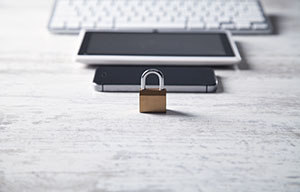Smart (but cheap!) Things to Bolster Your Digital Security
October 16th, 2019 | 3 min. read

Have you ever mentioned – or even thought about – an object in casual conversation only to see an ad for that very thing online seconds later? Maybe it was all coincidence. Or, maybe not.
The fact is most of what you do online is tracked and analyzed by others, be it for marketing or more nefarious purposes. And, with the proliferation of smart speakers and virtual assistants, what we say in the comfort of our homes may be, too.
The thought of constantly living under the watch of prying eyes is uncomfortable at best.
Outside of forsaking the internet completely, however, there is no unassailable way to hide. But you don’t have to go to such extremes. Nor do you need to buy a lot of expensive security software to build a digital fortress that’s the equivalent of Fort Knox. Instead, these tools can help keep you safe without figuratively breaking your bank.
Password manager
If you’re like most people, you recycle the same usernames and passwords for all your accounts. It’s so much easier to remember, right? Of course, the problem is self-evident. A hacker obtains your password to one account and could then have access to all your accounts.
The challenge of creating multiple secure passwords and keeping track of them can be delegated to a password manager. It is a software application that will generate and retrieve different complex passwords for each site for which you need login credentials. The only password you’ll have to remember is the one that gets you into the password manager. Some password managers will also notify you if one of the websites you use has been hacked so you can change your login information.
Password managers typically cost a small fee per year, but there are free versions available. You can compare ratings and costs online to find the one that fits your needs.
VPN
VPN stands for virtual private network. It is a technology that provides additional security and anonymity when using the internet. A VPN can help hide your browsing history and ward off online trackers. Perhaps its greatest feature is creating a secure connection for when you’re using public Wi-Fi.
VPN service plans are much like signing up for a cable or cell phone provider, but much cheaper. There are several reputable VPN services designed for individual users at an affordable monthly or yearly price.
Two-factor authentication app
If you have ever been required to provide a code sent in a text or email to access an account, then you already have experience with two-factor authentication. As the name implies, it is the security process of providing a second piece of authentication in addition to your password.
The most effective way to use two-factor authentication is by downloading an application to your phone that connects to all your accounts. That way, one would essentially need both your password and your phone to access your account. That doesn’t mean two-factor authentication is wholly impenetrable from hackers. It’s still possible to be tricked by fake login pages or emails. Therefore, always proceed with caution and use your app over other verification methods.
Piece of electrical tape
Yes, this is an analog device for a digital problem. But it works.
Chances are no one is watching you through your computer like a webcam of baby pandas at the zoo. Still, it has been well documented hackers and other devious individuals can gain access to someone else’s computer camera. Further, there have been several cases where video-chat or video-conferencing software is revealed to have vulnerabilities that allows access to your webcam from outside users.
What good is it to infiltrate a camera when you can’t see anything? Hence, the electrical tape. Just use a piece to cover up your camera. It may sound silly, but even household-name tech CEOs have been found to use this method. If you want a more cosmetic solution, you can buy webcam covers designed specifically for this purpose.
Paper shredder
Even in this digital age, a lot of sensitive material is transferred on good, old-fashioned paper. And thieves know it. According to a 2017 report by the University of Texas at Austin’s Center for Identity, 53% of consumer identity thefts are “non-digital,” meaning they didn’t involve a thief using a cyber vulnerability. Just think of what information – your Social Security number, birthdate, bank account number, address, etc. – listed on bills and statements that could be in your trash right now. If you don’t need it, shred it.
The bottom line
At the very least, hopefully this list of tools will open your eyes to the various things you could be doing to protect yourself online. Digital security doesn’t have to cost much, but leaving yourself vulnerable to hackers likely will.
Advance Capital Management is a fee-only RIA serving clients across the country. The Advance Capital Team includes financial advisers, investment managers, client service professionals and more -- all dedicated to helping people pursue their financial goals.
